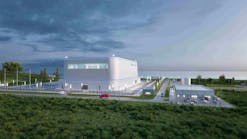Nicor Gas, Southern Co. and Habitat for Humanity chapter unite for Net-Zero Neighborhood goal
Nicor Gas, Southern Co. and Habitat for Humanity chapter unite for Net-Zero Neighborhood goal
Nicor Gas, the utility holding firm Southern Company and Fox Valley Habitat for Humanity announce partnership for a new Smart Neighborhood community designed to be carbon-neutral and achieve net-zero in Aurora, Illinois.
Each of the 17 homes in the community to be served with natural gas service will have solar panels, battery storage, smart electric panel, insulating concrete form walls, spray foam, energy efficient windows, energy recovery ventilation unit and LED lighting. The homes are designed to achieve net zero carbon dioxide emissions, thereby balancing greenhouse gas emissions.
The U.S. Congressman Bill Foster (D-IL) of the 11th District has secured $1.25 million in federal funding to provide the infrastructure for this Smart Neighborhood. The second neighborhood developed by Habitat for Humanity and Nicor Gas in Northern Fox Valley is expected to be introduced in 2024.
"Habitat for Humanity has led with the philosophy that home buying provides stability and resiliency to our first-time home buyers. In partnering with Nicor Gas on these neighborhoods designed to achieve net zero, we are further supporting our goals with smart energy solutions and technology that will empower our homeowners through energy bill affordability and tremendous resiliency during inclement weather," said Jeffrey Barrett, CEO and executive director of Fox Valley Habitat for Humanity.
Many public and private entities are aiming for energy efficiency gains and distributed energy resources to reach net-zero goals for their buildings. Energy use by commercial and industrial buildings account for close to 30 percent of the greenhouse gas emissions in the U.S. and globally.
For instance, biotech firm United Therapeutics has completed its second, net-zero energy distribution center at the co-headquarters campus in North Carolina. United’s 55,000-square-foot facility combines a geothermal system, a microgrid with rooftop solar and battery energy storage, as well as smart building technologies and lighting sensors.
Delta Electronics Americas’ headquarters in Fremont, Calif., has earned the LEED Zero Energy certification. Rooftop solar adorns both the buildings roof and carport tops, as well as energy efficiency tools to enhance the data center cooling system.
Boston University also has unveiled its net-zero computing center on campus.





